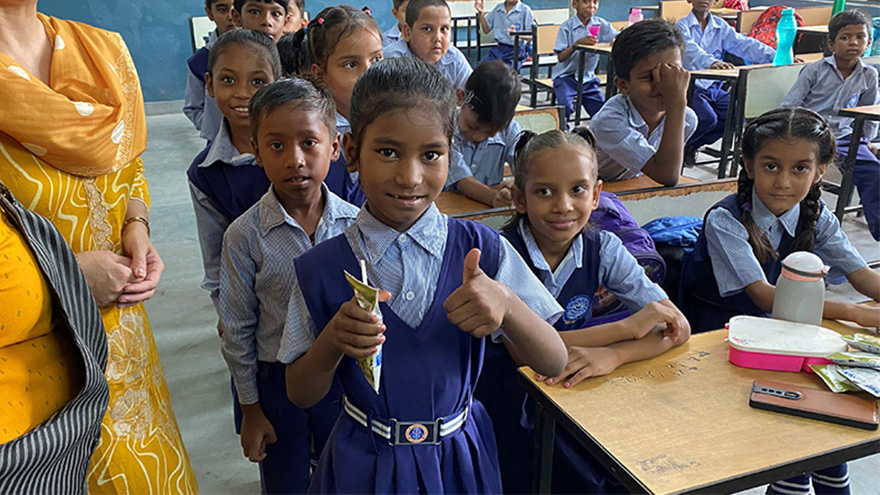Chandigarh is a union territory (federally governed city) that serves as the joint capital of the states of Punjab and Haryana in northern India. The city is known for having a relatively high per capita income, attracting many workers from different Indian states to its workforce.
BACKGROUND AND INITIATIVE
Cooperating to improve childhood nutrition
According to the Poshan tracker submitted to India’s Parliament in 2024 by the Ministry of Women and Child Welfare, the status of undernutrition among children below the age of five in Chandigarh is among the highest in the region. In this age group, 27.8% of children suffer from stunting (low height for age) and 8.73% are underweight. Both are strong indicators of inadequate nutrition.
Nutrition directly affects the growth and development of children. To reach their full potential, children need nutritious food during their developmental years. Children under five are particularly vulnerable to malnutrition, which can be critical and lead to lifelong physical and mental deficiencies.
Under the PM Poshan Shakti Nirman Scheme (popularly known as PM POSHAN), the Government of India provides one hot cooked meal to children in government schools to combat micronutrient deficiencies in children. The scheme began during the 2021 – 22 school year and is scheduled to continue into the 2025 – 26 term.

To provide supplementary nutrition to children in schools, the UT (Union Territory) school education department introduced the distribution of UHT milk from Verka Dairy Chandigarh in Tetra Pak Tetra Fino aseptic 130 ml packages. Starting with a trial period of six weeks, the programme provides beverages once per week to 100,000 schoolchildren in grades one through eight at 118 government schools in Chandigarh.
According to Sh. Rahul Gupta (IAS), Managing Director of MILKFED, Punjab (Verka Dairy),
“The essential nutrients of milk including calcium, proteins, and vitamins, are vital for the growth of children. Introducing milk in schools for the children will help address any nutritional deficiencies among them. Undernutrition and nutritional deficiencies can cause stunting, wasting, weakened immunity and cognitive impairments, all of which can be mitigated by regular consumption of milk. We are pleased to collaborate with Tetra Pak in this initiative.”
The milk is processed and packaged using Tetra Pak’s aseptic technology at Verka Dairy Chandigarh to help ensure food safety and quality while providing the children with important nutrition in an enjoyable format. With aseptic technology, UHT milk can be safely transported to schools without the need for a cold chain, and subsequently stored at room temperature.
The milk used by Verka Dairy is sourced from smallholder farmers in Punjab. Tetra Pak also supports Verka Dairy with a Dairy Hub project by providing technical assistance and support to smallholder farmers and extension service officers, both in the classroom and at the farms, training the farmers to increase their productivity. This initiative helps ensure market access to the farmers, thus improving their livelihoods.
Essential nutrition for better health and education
Vulnerable communities are more likely to have insufficient access to nutrition. Therefore, receiving milk – a protein-rich, nutritious food – through school milk programmes can help supplement basic nutritional needs. School milk programmes can also contribute to improved enrolment and decreased drop-out rates among children from socio-economically disadvantaged backgrounds.
Tetra Pak contributed their expertise in food safety and quality, providing training and sharing best practices gained from participating in school feeding programmes around the world. The aim is to ensure the effective utilisation of precious government resources and efficient implementation of the school milk programme. Over 200 participants attended this training programme, which was conducted in Chandigarh.
“We are proud to collaborate with Verka Dairy and the local government to address child malnutrition in Chandigarh. By providing safe and nutritious UHT milk through our school milk programme, we aim to support the health and development of children, ensuring they have the opportunity to thrive. This programme nourishes young minds and also instils a sense of environmental responsibility among students. Together, we are making a meaningful impact on the lives of many, and we are proud to uphold our commitment to protecting what’s good – food, people, and the planet,” says Cassio Simoes, Managing Director, Tetra Pak, South Asia Markets.

Continuing to address childhood malnutrition and sustainability
The school milk programme in Chandigarh is expected to continue for a longer duration than its initial six weeks and may increase to more serving days per week.
Upon seeing the initial success of this programme, the Government of Union Territory of Chandigarh’s social welfare department has started a new milk programme. This new programme will target both severely acute malnourished children and moderately acute malnourished children aged three to six, as part of the PM POSHAN programme for 10,000 children in 450 Anganwadi schools (preschools).
In addition to the nutritional benefits, the school milk programme aims to foster environmental responsibility among participating students. After consuming their milk, students will dispose of the used beverage cartons in recycling bins at participating schools. The cartons will then be collected and recycled into furniture and stationery to be used in schools. Some of the schools have already received school benches and desks, which are being used by the students.
“School milk programmes have proven to play a vital role in improving children’s health and education as well as supporting local agriculture development worldwide. As part of our purpose and value-added support, we are proud to provide technical training in food safety, programme implementation and evaluation sharing best practices used globally. This programme is a great example of collaboration with our customer Verka Dairy, local authorities and the community,” concludes Rafael Fabrega, Vice President - Tetra Pak Food for Development.






